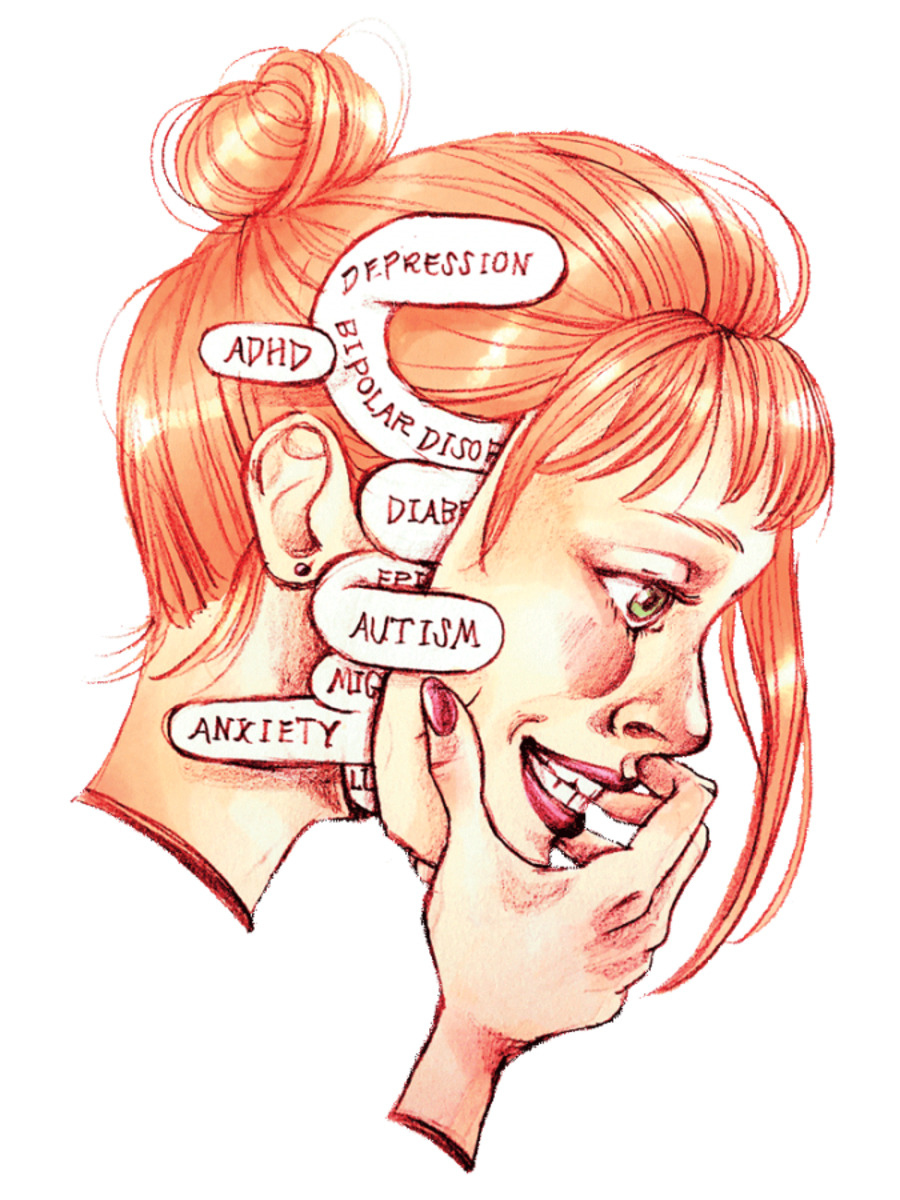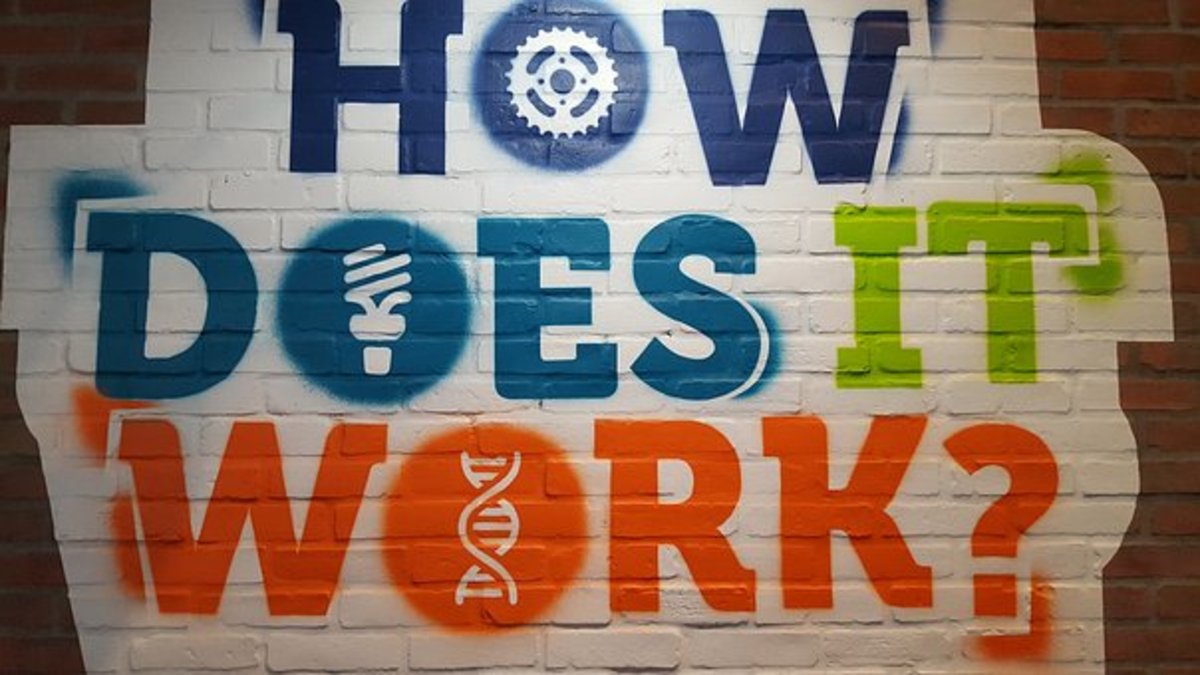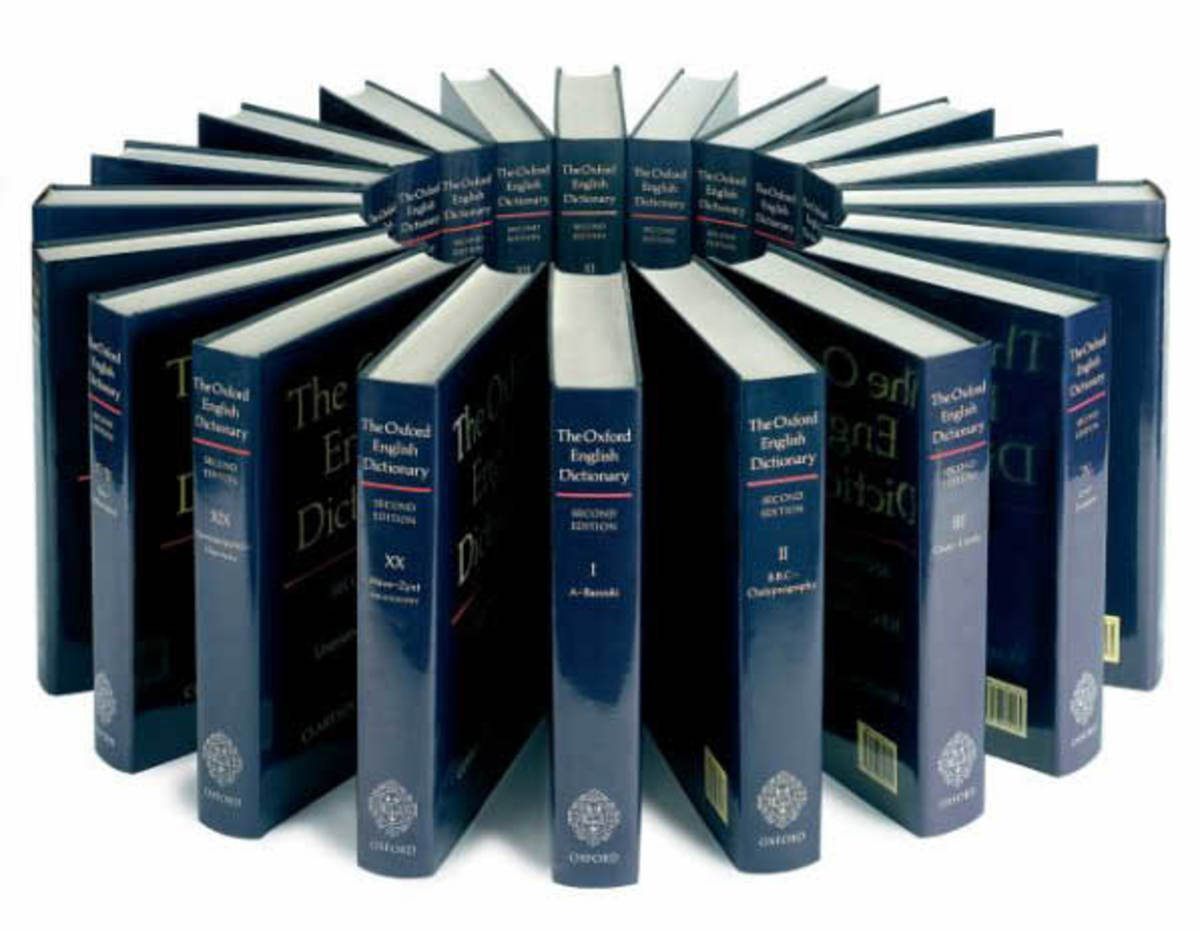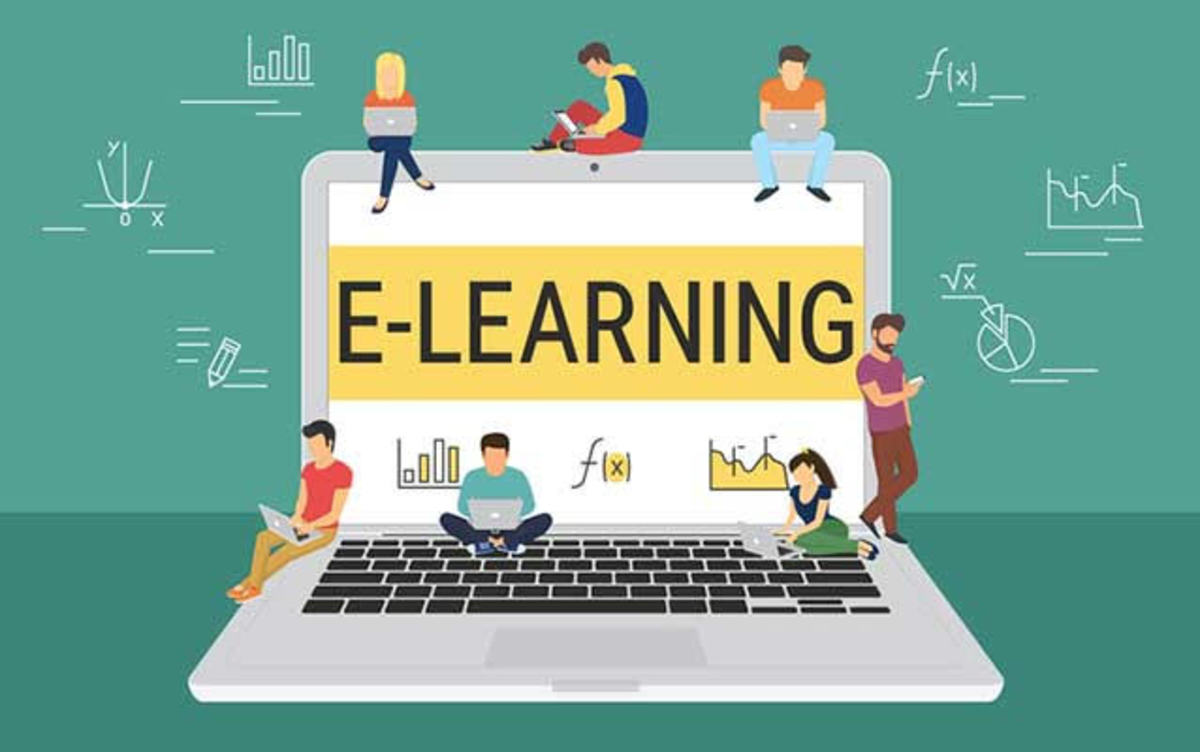Stategies for Tutors: Reading Disabilities

‘Students with disabilities’ is a category that could include any individual with a learning, mental, social, psychological, biological or physical disability. Within ‘learning disabilities’ there are even more categories, but for the purpose of this paper, I will be focusing on reading disabilities. According to Public Broadcasting Service (PBS) (2013) there are even several different types of reading disabilities: students afflicted by a reading disability have issues with decoding, comprehension and/or retention. Dyslexia is an example of a reading disability concerning decoding difficulties; Auditory Processing Disorder is an example of a reading disability concerning comprehension difficulty; and Attention Deficit Hyperactivity Disorder (ADHD) is an example of a disability that also concerns retention difficulties. Within this essay I will explore these and other disabilities/disorders like them in an attempt to build a better understanding about reading disabilities. Additionally I will offer strategies to tutors that I believe will be effective and helpful for these types of tutees.
Decoding: According to author Ann Logdson (2013), “readers sound out words by pronouncing their parts and then joining those parts to form words. In order to read with sufficient fluency to comprehend what is being read, readers must be able to decode words and join the parts quickly and accurately” (para. 1). However to a student with a decoding disability, such as Dyslexia or Visual Processing Disorder, reading can become an increasingly difficult task – the only way to overcome issues with decoding is through practice. In Elementary school, I was told by my school nurse that I suffered from a mild instance of Dyslexia, which explained why I was always frustrated with reading as a child. Now, as a 20-year-old woman, I am studying Writing Arts in college and am a Writing Tutor, so obviously my Dyslexia has not held me back. However I was extremely determined to overcome my reading disability and it was a mild case, so my chances of overcoming it were greater. My Dyslexia flares up when I am aggravated, exhausted or simple ‘sick and tired’ of reading, for whatever reason; I have to focus very hard to no fall into what I call the ‘dead reading trap’, which is when you a student is reading and suddenly they lose focus, but continue to ‘read’. While the student is fulfilling the physical head and eye motion of ‘reading’, they are not decoding, comprehending and/or retaining anything. I see a lot of students with reading disabilities fall into the ‘dead reading trap’ because reading can be a frustrating, demeaning or even embarrassing process for them – I know it was for me.

Strategy: The best way I have learned to approach a session with a student dealing with a decoding difficulty is to have them talk everything out. Talking and Writing go hand-in-hand, especially in a tutoring session. McAndrew & Reigstad (2001) note that “students are far more experienced as talkers than as writers” (p. 4), and that is a completely accurate statement. For students with a decoding disability this can be especially true because they may be specifically avoiding written communication, so they turn to verbal communication, and result as much better talkers than writers. Sarah Hines (2010) says the vocal skills of a child, with a reading disability concerning decoding, should be utilized further,
“Many adolescents, especially those with learning disabilities, lack basic word identification skills. Finding motivating instructional techniques to improve word-level reading skills is increasingly difficult as students move through the grades. One technique that holds promise in motivating adolescents involves using song lyrics from their favorite songs as instructional materials” (p. 16)
The justification of this technique is because students will have an easier time reading printed song lyrics of their favorite songs because the lyrics are already stored in their memories. Association of words they already know with printed words, that they would normally have trouble reading, is extremely helpful in getting students to overcome or deal with their disability independently. My distance vision has deteriorated a little bit with time, so if I’m not wearing my glasses small writing is very hard for me to read. However I use the association skills, I picked up when practicing vocabulary to overcome my mild dyslexia, to ‘decode’ words within a specific context.
Comprehension: According to Gary Wolley (2011) reading comprehension is “a flexible and ongoing cognitive and constructive process…of making meaning from text” (p. 15). It is a skill most able minded individuals take for granted because we most humans access this cognitive function every single day: reading a newspaper headline, a text message, an e-mail, an advertisement on the television, subtitles, warning labels, nutritional information on food, a ‘meme’ on the internet, etc. Students who especially have trouble with reading comprehension could be facing an Auditory Processing Disorder (APD), and/or Aphasia. David R. Moore, Melanie A. Ferguson, A. Mark Edmondson-Jones, Sonia Ratib, Alison Rile (2010), authors of “Nature of Auditory Processing Disorder in Children” report that individuals facing APD may experience “listening difficulties, usually involving speech perception…caused by impaired bottom-up processing of sounds by the brain, in the central auditory system” (p. e383). While this may seem like it has nothing to do with reading, “children with a broad language processing deficit may have problems with comprehension even when they can decode words accurately” (Reading Rockets, 2013, para 10). Children with reading comprehension difficulties can become especially frustrated because they can read the words, but just not understand what they read. Dysphasia and Aphasia are different because, unlike APD, one acquires a brain injury that results in one of these disorders. According to The Free Dictionary’s medical dictionary (2013), aphasia is the “partial or total loss of the ability to articulate ideas or comprehend spoken or written language, resulting from damage to the brain caused by injury or disease” (para. 1). A student facing aphasia can have a lot of problems understanding spoken language and/or have poor reading comprehension.
Strategy: Once again, repetition and practice is the key to overcoming, controlling and/or coping with a learning disability. Scholastic (2013) offers six quick tips for helping early readers improve their reading comprehension: “have him read aloud…provide the right kinds of books…reread to build fluency…talk to the teacher…supplement class reading…talk about what he’s reading” (n.p.). As mentioned before a majority of humans, especially those with learning disabilities, are far more experienced in talking than writing (though of course there are exceptions). By engaging a student’s strongest skills as a means to improve his weakest skills, the student is less likely to feel belittled or ‘stupid’. According to the National Center for Learning Disabilities (2013), “reading comprehension interventions are among the most effective interventions among children with [learning disabilities]. Students with [learning disabilities] need to learn an array of strategies to enhance their understanding of the narrative and expository material they read” (p. 2). Giving a student as many options as possible will promote growth and self-help over dependence on instructors.
Retention: There are three types of memory: short-term/“working” and long term. With each type of memory comes an array of disabilities that can affect the retention of students. Among this array include all types of disabilities, difficulties and disorders. Note: While the main focus of this essay is to deepen our understanding of reading disabilities, I will touch upon other disabilities as well.
Long Term Memory: “Anything you remember that happened more than a few minutes ago. Long-term memories can last for just a few days, or for many years” (Posit Science, 2013, para. 1). The following flow chart, from Posit Science’s (2013) article on long term memory explains the breakdown of long term memory:
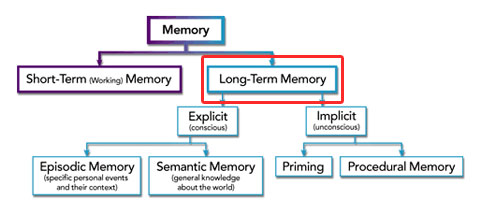
“Memory loss…is typically associated with aging. However, several factors may lead to memory loss in children -- for example, emotional stress associated with loss, traumatic events as well as abuse and neglect. Memory loss at a young age may be the result of a stroke gone unnoticed or other serious health-related conditions” (Lawson, 2010, para. 1). A student facing depression or anxiety is more likely to suppress a long-term memory to the point where the memory no longer exists to him/her. This is problematic for the student when (s)he is asked to write about personal experiences or touchy subjects. This is even more problematic for the tutor when (s)he is trying to develop an understanding or his/her tutee. Not knowing someone’s trigger can be very dangerous, but as tutors we cannot be expected to know everything about everyone. We must remember, though, to be careful with what we say to whom.
Strategy: Students facing long-term memory problems are typically somewhat cognitively impaired, the most common cause being acquired brain injury. A diagnosis of the student is required before a doctor can provide treatment options. As tutors our greatest tool with these students is patience and practice. If someone loses their long-term memory, it means they once had it. If the brain injury was not detrimental regaining some of those memories is possible. Our senses get triggered every day, but for a student with long-term memory loss one of those triggers could lead to the full or partial recovery of his/her memory. There are not a lot of sources for tutors with these kinds of tutees. It is the belief of Schoolhouse Tutoring (2013) that “all children can learn and can be successful students. The key to learning and academic success is finding the instruction and support that meets the learner's individual needs” (Philosophy and Mission Statement). Schoolhouse Tutoring is especially optimistic about the power of tutoring. However as a college tutor, I do not get detailed profiles of my tutees, or have time to pick apart their psyche. At Schoolhouse Tutoring (2013) they recommend all potential tutees undergo cognitive, memory and/or academic skills testing, especially if "the student has been experiencing significant learning problems” (Cognitive Testing). In regards to memory, they test the following kinds of memory, to improve their students’ tutoring experiences: short-term, working, long-term, visual, verbal, retrieval and recognition. The best measures for tutors to take are to form the most solid understanding of the different kinds of long-term memory. The more you know, the better prepared you can be as a tutor.

Short Term/“Working” Memory: These two types of memory are very similar and some consider them interchangeable, for the purpose of this essay, I consider them separate and equally important. Posit Science’s (2013) differentiation is that working memory “emphasizes the brain's manipulation of information it receives (using it, storing it, and so on), while short-term memory is a more passive concept” (para. 2). A sticky note would be an appropriate analogy for “working” memory: it keeps information just long enough for you to use it. Short term memory, on the other hand, contains things like: the content of an unimportant conversation you have just had with someone at school/work, remembering who you have said hello or goodbye to at a party, ect. A type of disability that affects both short-term and “working” memory is Attention Deficit Hyperactivity Disorder (ADHD).
Strategy: In the case of ADHD, symptoms are fairly easy to detect: insensitivity, difficulty controlling emotions, difficulty sitting still, difficulty finishing tasks, lack of focus, makes careless mistakes, and/or day dreams often. These students often go to the writing center with an unorganized paper, an incomplete draft, sometimes no draft, sometimes not even a topic. Tutors should be prepared to handle a student at any stage of the writing, drafting or revising process. If a tutor suspects that a student has ADHD, she should take on a more directive role than usual. Students with ADHD have difficulty keeping themselves focused; therefore the tutor must keep the session on track. Keeping the attention of a student like this is crucial to have a successful session. Additionally tutors must remember to not let the student use his disorder as an excuse not to do work. Unfortunately there are cases where a student with a disability has been conditioned by the world around him to use his disorder as a crutch and/or excuse to be responsible. For a college student with ADHD, they are far past the age to make any excuses. There are plenty of resources and strategies for hyperactive students to overcome and/or control their hyperactivity. With that in mind, do not task these students with too many things at once. While they may like to multitask on their own terms, they typically get overwhelmed if it’s pushed upon them.
Students with disabilities are not a “breed of their own”, their just students who need a little extra help. As a college writing tutor I can say: students with learning disabilities, who seek out the writing center, are some of the most enthusiastic and motivated tutees I have met. They are typically eager to learn, especially in a college setting. It is important that the tutor remember to keep the quirks, of whatever disabilities and disorders she can remember, in mind. That being said, the tutor should not feel obligated to “fix” a paper for obvious writing errors, just as they would not feel that way with a “normal” student. Tutors must remember their training and utilize all of their knowledge to be a successful tutor; this is even more so true when in a session with a learning disability. Reading disabilities can be tricky to deal with especially, because the inability to read well or at all typically goes along with the inability to writer well or at all. These students take patience, practice and encouragement, above all.
References
Bender, W. N. (2010, July 20). Memory and children with learning disabilities. Retrieved December 3, 2013, from Education website: http://www.education.com/reference/article/memory-children-learning/
Gersten, R., Ph.D., & Baker, S., Ph.D. (2013). Reading comprehension instruction for students with LD. Retrieved December 9, 2013, from National Center for Learning Disabilities website: http://www.ncld.org/students-disabilities/ld-education-teachers/reading-comprehension-instruction-students-with-ld
Helpguide.org. (n.d.). Learning disabilities & disorders. Retrieved December 3, 2013, from Help Guide website: http://www.helpguide.org/mental/learning_disabilities.htm
Hines, S. J. (2010). Name that word: Using song lyrics to improve the decoding skills of adolescents with learning disabilities. Teaching Exceptional Children, 43(1), 16-21.
Khatib, M., & Safari, M. (2011). Comprehension of discourse markers and reading comprehension. Englidh Language Teaching, 4(3), 243-250. Retrieved from ProfSearch database.
Lawson, M. (2010, October 15). Memory loss in children. Retrieved December 9, 2013, from Livestrong website: http://www.livestrong.com/article/280606-memory-loss-in-children/
Lodgson, A. (n.d.). Understanding reading decoding. Retrieved December 3, 2013, from About website: http://learningdisabilities.about.com/od/resourcesresearch/a/Understanding-Reading-Decoding.htm
McAndrew, D. A., & Reigstad, T. J. (2001). Tutoring writing. Portsmouth, NH: Boynton/Cook Publishers, Inc.
Moore, D. R., Ferguson, M. A., Edmonson-Jones, A. M., Ratib, S., & Riley, A. (2010). Nature of auditory processing disorder in children. Pediatrics, 126(2), e382-e390. http://dx.doi.org/10.1542/peds.2009-2826
Posit Science. (2013). Long-term memory. Retrieved December 9, 2013, from Posit Science website: http://www.positscience.com/brain-resources/memory/types-of-memory/long-term-memory
Posit Science. (2013). Short-term memory. Retrieved December 9, 2013, from Posit Science website: http://www.positscience.com/brain-resources/memory/types-of-memory/short-term-memory
Public Broadcasting Service. (n.d.). Signs of a reading disability. Retrieved December 3, 2013, from PBS website: http://www.pbs.org/parents/education/learning-disabilities/types/reading/signs-of-a-reading-disability/
Rasmussen, C., Treit, S., & Pei, J. (2013). Memory interventions for children with memory deficits. In Center for International Rehabilitation Research Information and Exchange (Ed.), International encyclopedia of rehabilitation. Retrieved from http://cirrie.buffalo.edu/encyclopedia/en/article/276/
Scholastic. (2013). Improve reading comprehension. Retrieved December 9, 2013, from Scolastic website: http://www.scholastic.com/parents/resources/article/developing-reading-skills/improve-reading-comprehension
Schoolhouse Educational Services. (2013). Cognitive testing. Retrieved December 8, 2013, from Schoolhouse Tutoring website: http://schoolhousetutoring.com/cognitive%20testing.htm
Schoolhouse Educational Services. (2013). Index. Retrieved December 8, 2013, from Schoolhouse Tutoring website: http://schoolhousetutoring.com/index.htm
WETA. (2013). Target the problem! Other sources of reading difficulty. Retrieved December 8, 2013, from Reading Rockets website: http://www.readingrockets.org/helping/target/otherissues/
Wolley, G. (2011). Reading comprehension. http://dx.doi.org/10.1007/978-94-007-1174-7



